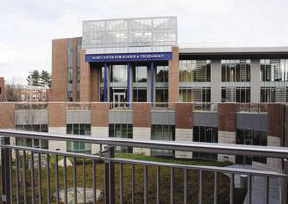The Mars Center for Science andTechnology on the Wheaton College campus has been awarded high honors in recognition of its environmentally-friendly design and the sustainable practices that were followed in its construction.
The $42 million facility earned LEED Gold Certification from the U.S. Green Building Council, which has set national standards for the design, construction and operation of buildings that meet the highest green building and performance measures.
"Our goal was to achieve silver certification," said president Ronald Crutcher. "We exceeded that goal thanks to the support of our donors, the vision of our faculty, attention to detail of the college's staff and our builder's representative, The Rise Group; the expertise of our architects EYP; and the follow through of the general contractor, Bond Brothers."
The Mars Center, which features 12 teaching labs and 23 research labs as well as a roof-top observatory and greenhouse, opened in the fall of 2012. Sustainable concepts incorporated in its design include:
A 1,300 s/f "green" roof
Drought-tolerant plants to conserve water
Glass curtainwalls maximize interior daylight
Solar shading on glass and brim to reduce solar heat during the summer
Dark sky-compliant exterior lighting that eliminates uplight to reduce light pollution
Occupancy and daylight sensors to reduce interior lighting energy consumption
Energy recovery wheels in the air-handling units to significantly reduce heating and cooling loads
Other details of the project that contributed to LEED gold certification include:
The building's design includes a green roof, and landscaped plantings cover more than 65% of the project site with native and adaptive species accounting for more than 40% of the plants.
The building's HVAC system achieved an energy savings of 28%, according to international standards for heating, cooling and air circulation.
During construction, the college and its contractors recycled or reused 691.74 tons (88%) of construction waste that would otherwise have ended up in landfills.
Approximately 22% of materials for the building were manufactured from recycled materials.
91% of the wood-based materials used come from forests that are certified as being managed and harvested from FSC certified forests.
"This award reflects the commitment of the entire Wheaton community to excellence in every endeavor," said president Ronald Crutcher. "The Mars Center is an exceptional facility—as a place for learning and research as well as a model for sustainable development."
The benefits of the building's features not only conserve resources, but also create new learning opportunities, according to mathematics professor Tommy Ratliff, who served as the faculty coordinator for the project.
"Several faculty intend to use the LEED certification in their First Year Seminars, and there is the potential for this to spread to other courses as issues of sustainability become more important throughout the curriculum," said Ratliff, who added that faculty had identified LEED certification as a goal at early planning sessions ten years ago.
"Environmental sustainability has been important to the faculty from the inception of the project," he said. "One of the four goals that defined the planning for the Mars Center is that the project should be responsible to the Wheaton community and the environment."
The acronym LEED stands for Leadership in Energy and Environmental Design, and the standards embrace five key areas: sustainable site development; water savings; energy efficiency; materials selection and indoor environmental quality. Certification requires a lengthy and detailed process that begins with the building's design, and it extends throughout construction and beyond.
Tags:
Bond Bros.' Mars Center for Science project at Wheaton College honored by USGBC with LEED Gold Certification
August 23, 2012 - Green Buildings







